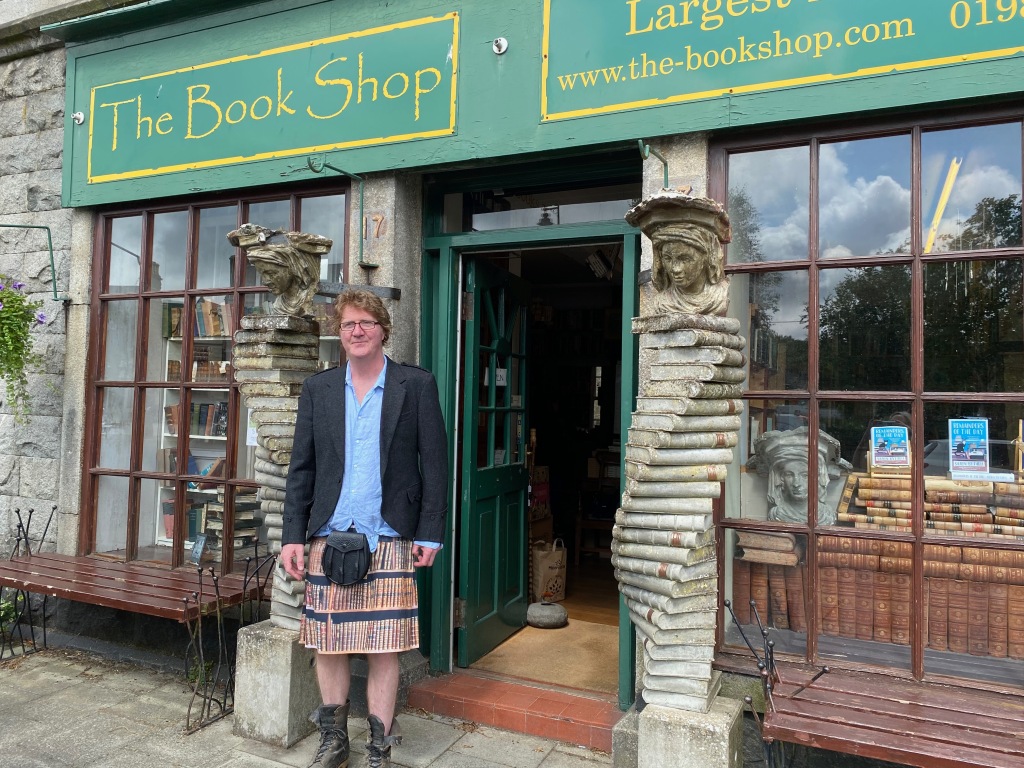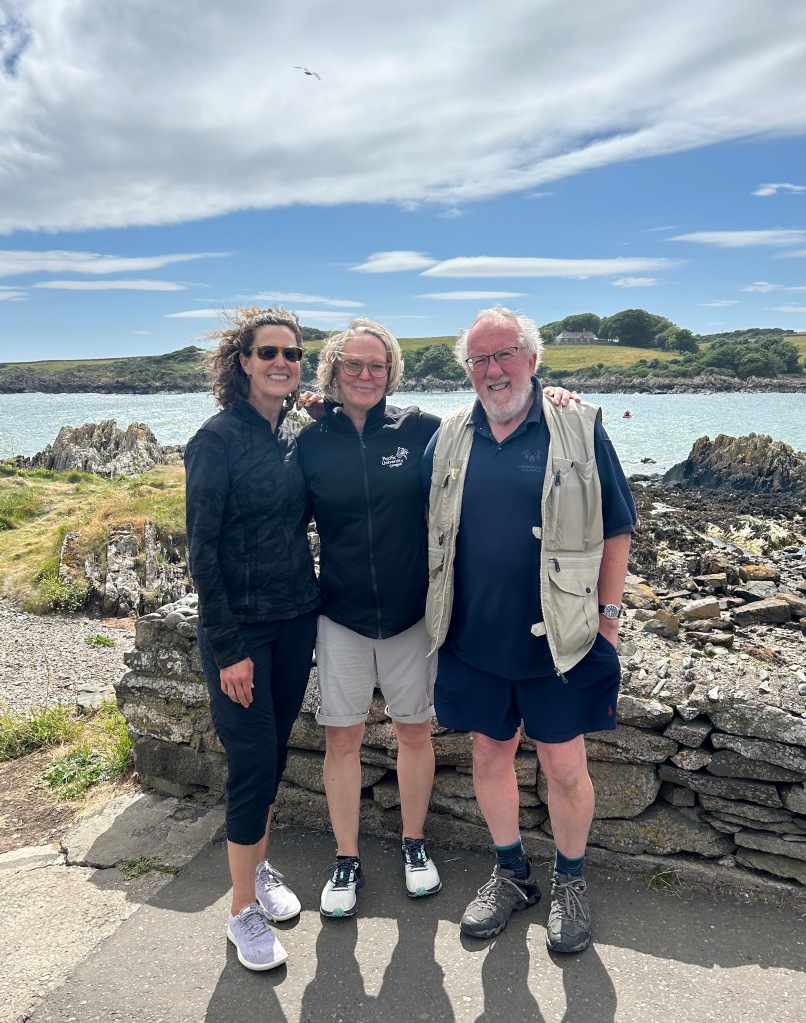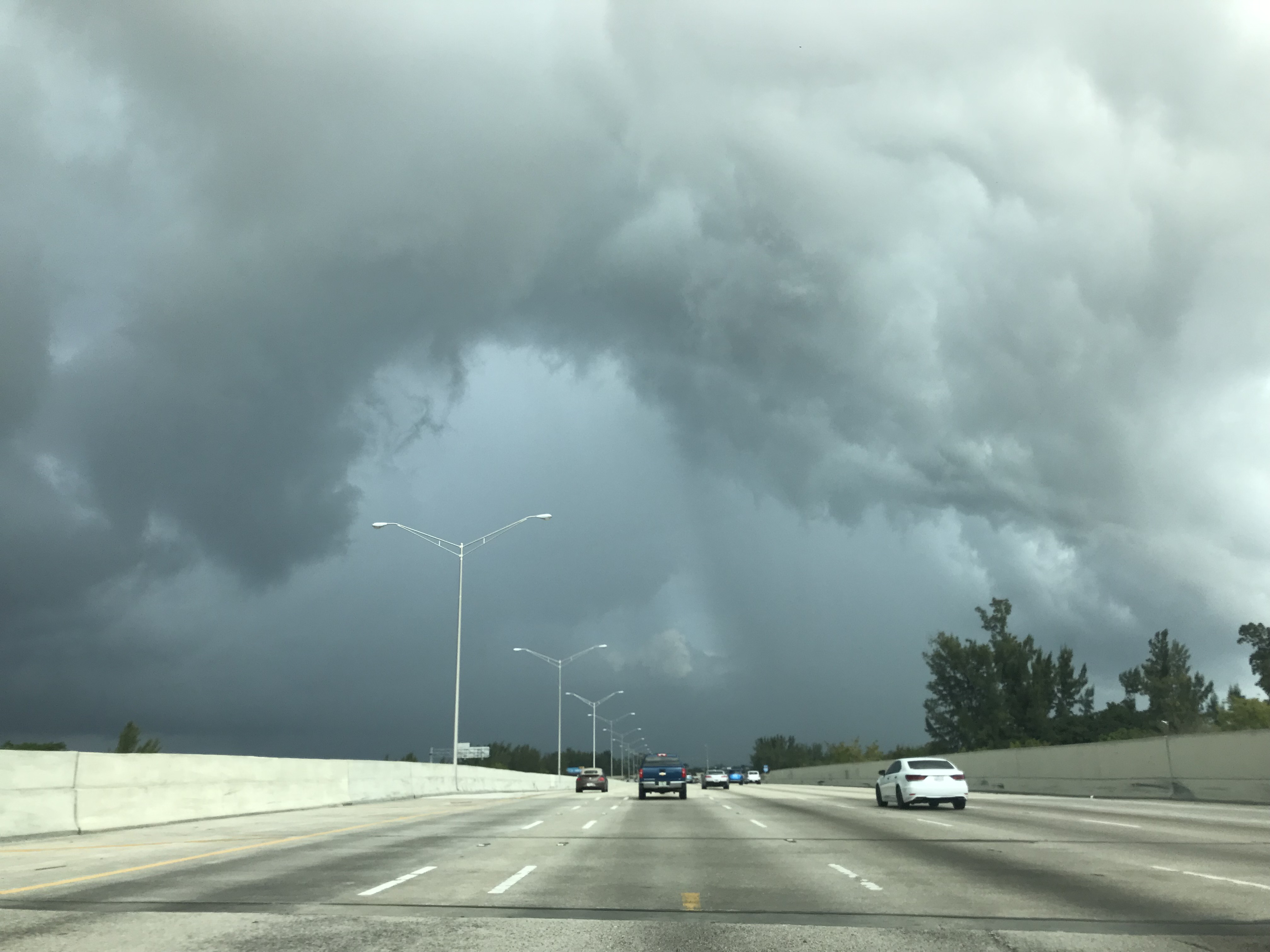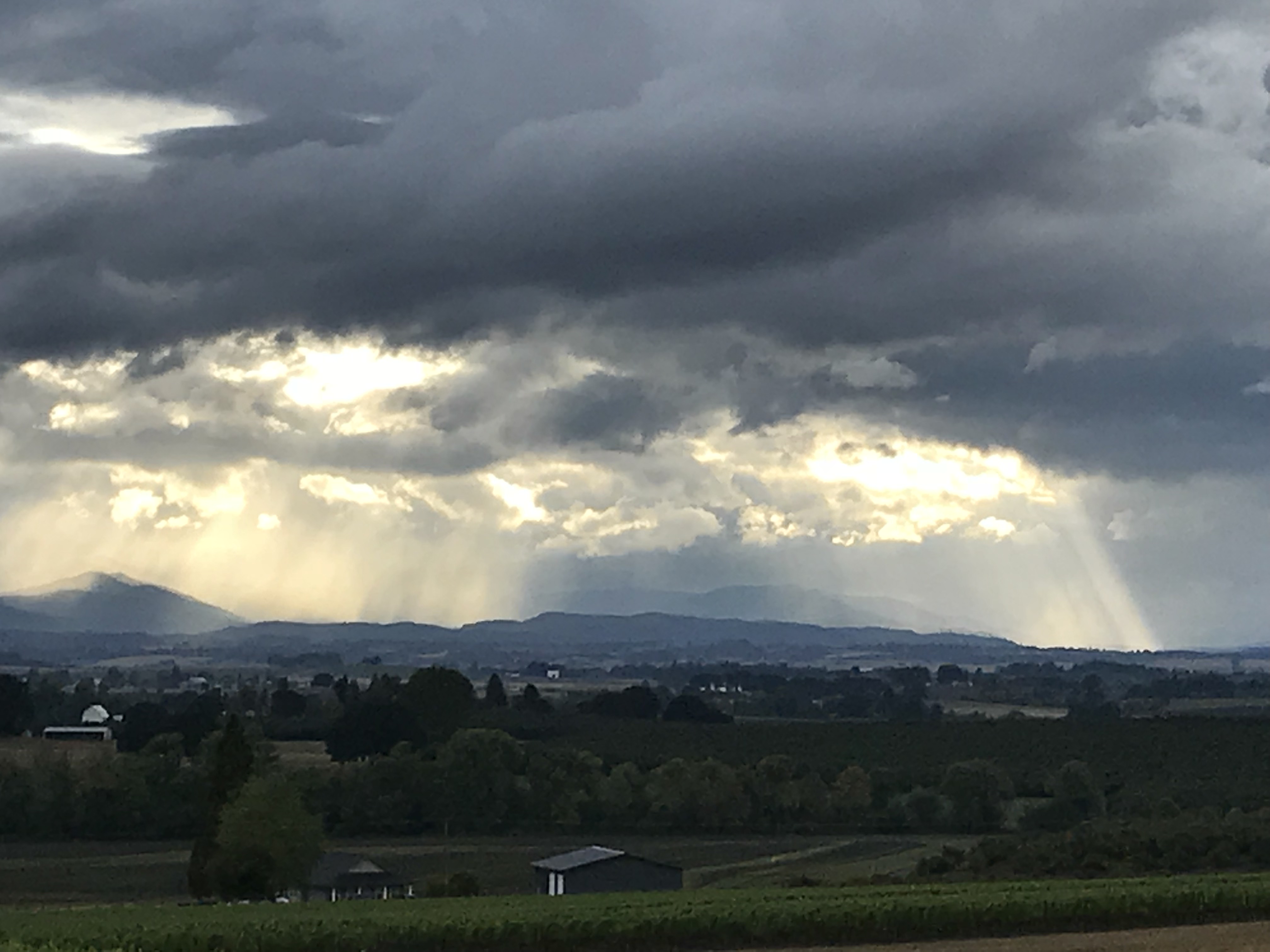Cake and Scones for Lunch and a Feast of Kindness in Wigtown
By Debbie McGinley and Jenny Pessereau
Learn how this Oregonized writer flew to Scotland for a “bookshop holiday experience” and you can, too, in this essay by writer Debbie McGinley and myself.

It was an author who brought us together, and it was because of an author-turned-agent that we found ourselves stranded on the side of the road on a recent June afternoon with two flat tires, six miles shy of Wigtown, Scotland’s National Book Town.
We were two children’s book writers, Debbie and Jenny, who had grown up on opposite sides of the United States and who, as adults, had settled near each other’s hometowns. We both also had taken a chance and submitted young adult manuscripts to New York Times bestselling author Veronica Rossi, who was mentoring writers for the SCBWI Nevada Mentor Program in 2015. The news that we each had been selected to work with Veronica for the next nine months changed our lives in more ways than we could have known.
While we learned from the sage edits, advice and encouragement Veronica provided, another true gem of the Mentor Program was the ongoing daily ritual that resulted and the unexpected friendship it cultivated. At Veronica’s suggestion, we agreed to exchange emails every morning about our day’s writing plans, as well as larger goals and challenges. Thousands of emails later, we still held each other accountable for our works-in-progress and had talked each other off multiple ledges and nurtured a valued friendship, and now, flown across the Atlantic to run a bookstore called The Open Book in Wigtown.

The dream had started five years prior when Debbie heard about the author-agent’s plan to travel to Scotland to run a secondhand bookstore for a week. Enchanted, Debbie quickly learned that The Open Book, an AirBnB, was anything but undiscovered. Wigtown is home to The Wigtown Book Festival, Scotland’s second-largest book festival, and with eleven bookstores, the town has attracted bibliophiles from around the world.
Undeterred, Debbie scoured the AirBnB calendar for listings and found a cancellation list to join. Five years and one pandemic later, she spotted a rare opening on The Open Book calendar. She leapt into action and secured the stay – we were in!

Now, after a trans-Atlantic flight and a two-hour, perilous drive on the left-hand side of the road, we found ourselves stranded just miles from our dream destination. What followed that moment became the first of many kindnesses, a recurring theme of our trip. With one message to Wigtown Book Festival organizer Anne Barclay, we were soon on our way again. Huddled together in her father’s tow truck, we rolled into town like conquering heroes.
The second act of kindness occurred even before we’d unlocked the door to the slightly dusty, slightly spider-infested, but utterly charming bookshop we’d oversee for the next week. Ben and Beth, members of The Bookshop Band, invited us to come ‘round for a barbecue in their backyard. “Let yourselves in, we’ll be out back,” Beth offered.

We were here to seize adventure and soak in as much of Wigtown life as possible, so we stowed our things in the upstairs apartment, oohing and aahing over the window seat overlooking the town square, and headed down the street along a row of pastel terrace houses. We walked into Ben and Beth’s backyard to find a baby in a highchair, a six-year-old jumping on the trampoline and Ben crouched near a pallet of freshly roasted dinner. We clinked glasses of cider to the loveliest welcome we could have imagined.

Acts of kindness followed. Ruth, from Well-Read Books next door, offering advice about the secondhand stock we might receive from other local booksellers, as well as tips on the best hours to open and close. Shaun, from The Bookshop, inviting us into his video to show off his custom-made kilt, featuring (naturally) a collection of colorful book spines. Joyce, from The Old Bank Bookshop, donating a children’s book for our window display. The women at the Community Shop, offering opinions on which of their fancy hats suited us best. Andy, the window washer, greeting us in the morning with a smile after we’d met him at the pub the previous evening. Dave, a Wigtown Book Festival volunteer, taking us on a grand tour of the Machars since we were, after all, car-less.
And we will always remember the brusque but cheery ladies at Reading Lasses, who regaled us with varieties of homemade cakes too tempting to choose between. Having come on the later side for lunch, and with the day’s soups finished, our meal consisted of voluptuous fruit scones accompanied by slices of moist, airy cake, flavored pistachio rose and chocolate orange. And of course, good, strong Scottish tea with milk and sugar.

While the community made our stay memorable, we made the bookshop our own children’s book haven. We affixed mermaid and unicorn decals to the windows and dangled strings of shiny silver palettes. We inflated a mylar unicorn as tall as we were and hung a vellum rainbow from the ceiling, taking care not to overshadow The Open Book cloth banners that already lived there. We even hosted an evening of Oregon wine tasting and creativity exercises and were gratified that the chairs we’d arranged earlier that day with hope were filled by people we’d already befriended, just a few days into our stay.

The opportunity to helm a bookstore was as special as we’d anticipated, but like the Mentor Program that brought us together, our Wigtown experience also yielded an unexpected bounty — kindness. We were folded into the life of a town filled with creative, bright, interesting and eminently thoughtful and welcoming people. What we didn’t expect from our bookshop adventure was to come away with a new group of friends that we were pained to leave behind, but whom we looked forward to reuniting with someday in Wigtown or beyond…maybe even as volunteers for The Wigtown Book Festival in a future autumn.
During our last afternoon in Wigtown, we canvassed the town’s shops and attractions, making every effort to see as much as possible of our home for the week. Our final stop was the Town Hall, a stately building looming large over the town green and overlooking the neat rows of two-story stone buildings on either side of the street. A volunteer named Grace left her desk to take us upstairs so we could admire the sweeping views of the old harbor and vibrant green pastures surrounding town. She showed us the prison cell, still standing from the 1600s, which had held Wigtown’s famous martyrs before they were tied to stakes and drowned in the harbor for holding fast to their religious views. As Grace walked us to the front door, she asked what time we were departing the next morning. Dave, our fearless tour guide, would be picking us up at 8 a.m. for the hour and a half drive to catch the train back to Glasgow.

“That’s a shame,” Grace said. “I’m the one who rings the bell in the tower, and I would have liked to have rung it for you, but I don’t want to risk pissing off everyone in town so early.” We thanked her for her thoughtfulness, stopped at the cafe for one more delectable slice of cake, made a final trip to the Coop for last-minute provisions and joined a birthday celebration in the town square, where a local gentleman ferried us beers from the pub. After only one week, our new friends felt like long-time presences in our lives.

The next morning, we turned the key in our flat’s front door a final time and loaded our suitcases in the trunk of Dave’s car. A light rain began to sprinkle and a bell tolled, low and steadfast, from across the square. It was Grace, sending us off on our journey with yet another act of kindness, ringing the bell to wish us well and “haste ye back.”
Haste ye back we will, Wigtown, to again immerse ourselves in the lush green fields dotted by purple blooms and gray stone walls, Beltie cows and sheep thick with wool, and new friends whose many kindnesses proved to be the true gift of our week as booksellers.
P.S. The Wigtown Book Festival celebrates its 25th anniversary this year from September 22 to October 1, 2023. Click the link to learn more about the festival, as well as the literary luminaries who will be participating.









